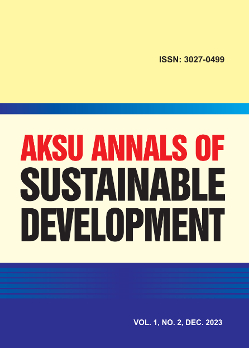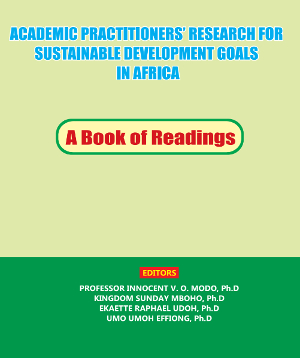ALCOHOL USE AND MENTAL HEALTH DISORDER AMONG YOUTHS IN RURAL COMMUNITIES OF ESSIEN UDIM IN THE POSTCOVID-19 ERA IN NIGERIA
https://doi.org/10.60787/AASD-1-1-1
Keywords:
rural communities, youths, mental health disorder, Alcohol useAbstract
The study focuses on alcohol use and mental health disorder among youths in rural communities of Essien Udim in the post Covid-19 era in Nigeria. The aim is to bring into the limelight an intervention strategy, via a community-based mental health approach, as an effective treatment option for mental challenges. Survey method with Rapid Individual Unstructured Interview (RIUI) and Focus Group Discussion (FGD) had been adopted and used. Participants are social workers in St. Joseph’s Rehabilitation Centre, Ukana Iba, caregivers of affected persons, registered women, and youth groups. A simple random sampling procedure was used to select the participants. Data are analyzed using the qualitative approach to identify alcohol use disorder and rehabilitation interventions among youths in Essien Udim communities. Findings show a wide gap in the area of research, with no readily available information for public use. It also reinforces the need for a community-based intervention strategy to address knowledge gaps of alcohol use and mental health effect on the socio-economic livelihoods of the people
Downloads
References
Adelekan, M.L., Abiodun, O.A., Obayan, A.I., Oni, G.A., & Ogunremi, O.O. (1993).
Psychosocial correlates of alcohol, tobacco and cannabis use findings from a Nigerian University. Drug and Alcohol Dependence, 33(3), 247-256.
Akpan, C. and Effiong, U.(2021). Communication and Social InclusionAdvocacy for Persons with Disabilities in Akwa Ibom State, Nigeria. International Journal of African Language and Media Studies, 1(1), 60-75. CBM (2010). Community Mental Health Implementation Guidelines. Germany: CBM Press.
Dumbili, E. W. (2013). The Politics of Alcohol Policy in Nigeria: A Critical Analysis of How and Why Brewers Use Strategic Ambiguity to Supplant Policy Initiatives, 2014, 49(4):473– 487.
Effiong, U., Ekanem, A., and Ottong, I. (2023). Inclusive Education and Sustainable Learning Opportunities for Persons with Disabilities in Akwa Ibom State University, Obio Akpa Campus, Nigeria. In: Innocent V. O. Modo, Kingdom S.Mboho, Ekaette
R.Udoh and Umo U.Effiong (Eds) Academic Practioners Research for Sustainable Development Goals in Africa. ICIDR Publishing House: Ikot Ekpene.
Effiong, U. and Ekpenyong, O. (2017a). Community-Based Rehabilitation Services and Livelihood Enhancement for Persons with Disabilities in Nigeria: A Case Study of Akwa Ibom State. Journal of Sociology, Psychology and Anthropology in Practice, 8(1), 62 – 67.
Effiong, U. and Ekpenyong, O., (2017b). Effect of Community Based Rehabilitation Services and Livelihood Enhancement among People with Disabilities in Akwa Ibom State, Nigeria. International Journal of Economic Development Research and Investment, 8(1), 15 – 30.
Effiong U., Kingdom M. and Wordu S., (2018), Post-Civil War Experience and Women with Disabilities in Nigeria .Journal of Research in Education and Society, 9(2), 105–126.
Effiong U.(2019). Gender and Health Inequalities amongst Rural Women with Disabilities in Ikot Ekpene Local Government Area of Akwa Ibom State. Akwapoly Journal of Communication and Scientific Research, 4(1), 88-103.
Effiong U., Udousung I. and Udoh E.(2018). Herdsmen/Farmers Crisis and Rehabilitation of Victims: A Study of Middlebelt-Nigeria. Uyo Journal of Sustainable Development, 3(2), 163-169.
Effiong, U. and Agha, E., (2020). Rehabilitation Interventions and Non-medical Use of Prescription among Persons with Psychosocial Disabilities in Selected Communities in Akwa Ibom State, Nigeria. In: Gboyega E. Abikoye and Isidore S. Obot (Eds) Perspectives on drugs, Alcohol and Society in Africa, Vol. 5. Centre for Research and Information on Substance Abuse.
Essien, C.F. (2010). Drug use and Abuse among students in tertiary institutions – The Case of Federal University of Technology, Minna.Journal of Research in National Development,8(1), 35- 42.
Eze NM, Njoku HA, Eseadi C, et al. (2017). Alcohol consumption and awareness of its effects on health among secondary school students in Nigeria. Medicine (Baltimore). 96(48):e8960
Ferreira-Borges C, Ketsela T, Munodawafa D, and Alisalad A. (2013). Reduction of the harmful use of alcohol: a strategy for the WHO African region. African Health Monitor, (16): 31–4.
Galvani S. (2015).Alcohol and other drug use: the roles and capabilities of social workers. Manchester Metropolitan University.
Haralambos, M. and Holborn, M. (2008). Sociology: Themes and Perspective. MacMillan
Hingson, R. Heeren, T., Levenson, S., Jamanka, A. (2002). Age of drinking onset, drinking after and involvement in alcohol related motor-vehicle crashes.Available at: https://scholar.google.com/scholar?q=Hingson+et+al.,+2002&hl=en&as_sdt=0&as_vis=1&oi=scholart
Iorfa, K., Steven, I., K., Ugwu, C., and Ifeanyi, C. M. (2018). Substance Use among Youths: Roles of Psychoticism, Social Alenation, Thriving and Religious Commitment. African Journal of Drug & Alcohol Studies, 17(2).
Jugessur, T., and Iles, I. (2009). Advocacy in mental health nursing: an integrative review of the literature.The Journal of Psychiatric and Mental Health Nursing,16 (2). Available online at: https://onlinelibrary.wiley.com/doi/abs/10.1111/j.1365-2850.2008.01315.x
Lang, R. and Upah, L.(2008). Scoping Study: Disability Issues in Nigeria. Final Report, Commissioned by DFID, April. Available online
at:http://www.ucl.ac.uk/lcccr/downloads/dfid_nigeriareport
Natera (1995). Natera Publishes Largest NIPT Outcomes Study Demonstrating Robust Clinical Performance Over a 4-year Period. Available at: https://www.biospace.com/article/releases/natera-publishes-largest-nipt-outcomes-studydemonstrating-robust-clinical-performance-over-a-4-year-period/
Nevid, .J.S., Rathus, S.A., & Greene, B. (2011). Abnormal Psychology in a Changing World (8th Ed.) Upper Saddle River, N.J.: Pearson Education, Inc.
Nwagu, E. N., Dibia, S. I. and Odo A. N. (2017). Socio-cultural norms and roles in the use and abuse of alcohol among members of a rural community in Southeast Nigeria. Journal of Health Education Research, 32(5), 432-436. Available online at: https://academic.oup.com/her/article/32/5/423/4080280
Okonkwo E.E. and Oguamanam C.C. (2013). Traditional crafts and tourism development and promotion in Etim Ekpo Local Government of Akwa Ibom State, Nigeria. Res Human Soc Sci, 3: 139–45.
PLAC (2020).The Discrimination Against Persons With Disabilities (Prohibition) Act. Review of Relevant Information on Nigeria’s Democracy. FACTSHEET . Available online at: https://placng.org/i/wp-content/uploads/2020/07/The-Discrimination-Against-Persons-withDsabilities-Prohibition-Act.pdf
Sudhinaraset, M., Wigglesworth, C. & Takeuchi, D. (2016). Social and Cultural Contexts of Alcohol Use: Influences in a Social-Ecological Framework. Available at: https://pubmed.ncbi.nlm.nih.gov/27159810/
Thomas, P. (2005). Disability, Poverty and the Millennium Development Goals: Relevance, Challenges and Opportunities for DFID. Available online at: https://www.researchgate.net/publication/37156446_Disability_Poverty_and_the_Millennium_Development_Goals_Relevance_Challenges_and_Opportunities_for_DFID
Ukwayi, J.K., Ambekeh, L.U., Uwanede, C.C., & Undelikwo, V.A. (2013). Alcohol abuse as a cause of poor academic performance among Social Science Students of the University of Calabar, Nigeria. Mediterranean Journal of Social Sciences, 4 (1), 413-22.
UNODC (2019).World Drug Report. Available at: https://reliefweb.int/report/world/unodcworld-drugreport2019?gclid=CjwKCAjw6vyiBhB_EiwAQJRopjsvVksJm8blq2SAxxjPHynU8jDysQ3lwDGH3dTN0xr8Lk_fL0xd-hoCAEIQAvD_BwE
Usoro, N., Ononokpono, D., Ette, U. & James, N. (2018). Community Perspectives on Cultural Practices and Belief Systems Influencing Alcohol and Drug Use: A Qualitative Study in Anaang Community, Nigeria. African Journal of Drug & Alcohol Studies, 17(2), 147-160.
vanHeerden , M., Grimsrud, M., Seedat, S., Myer, L., Williams, D., Stein, D., (2009). Patterns of substance use in South Africa: results from the South African Stress and Health study.Available at: https://pubmed.ncbi.nlm.nih.gov/19588799/WHO(2010). Community Based Rehabilitation: CBR Guidelines. World Health Organization.
WHO, UNESCO, ILO, IDDC(2010). CDR guidelines for community based inclusive development. World Health Organization. Accessed at
http://www.who.int/disabilities/cbr/guidelines/en/index.html.
WHO (2014). Alcohol and inequalities Guidance for addressing inequities inalcohol-related harm.
WHO Regional Office for Europe WHO (2020). Mental Health. Available at: https://www.who.int/news-room/factsheets/detail/mental-health-strengthening-our-response
WHO Annual report (2019): health for all. Available at: https://apps.who.int/iris/handle/10665/333249.
Downloads
Published
Issue
Section
License
Copyright (c) 2024 AKSU Annals of Sustainable Development

This work is licensed under a Creative Commons Attribution-NonCommercial-NoDerivatives 4.0 International License.
Manuscript content on this site is licensed under Creative Commons Licenses. Authors wishing to include figures, tables, or text passages that have already been published elsewhere are required to obtain permission from the copyright owner(s) for both the print and online format and to include evidence that such permission has been granted when submitting their papers. Any material received without such evidence will be assumed to originate from the authors.






 ICIDR Publishing House
ICIDR Publishing House